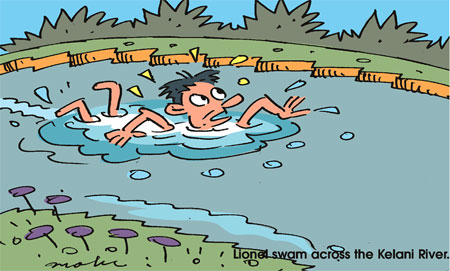|

by R. S. Karunaratne
Guide to the use of prepositions
There are over 100 prepositions in English. This is a very small
number compared to the vast number of nouns, adjectives and verbs we
use. Most sentences we make contain at least one preposition. To speak
or write natural English we should be able to select the right
preposition. The following guide will help you choose the right
preposition at the right time.

1. Aboard
When we are aboard a ship, aircraft or train, we are on it or in it.
The queen came aboard the Atlantic.
My luggage is aboard a Srilankan plane.
Scientists carry out experiments aboard the Chinese space shuttle.
The jet crashed, killing all the passengers aboard.
2. Across
If somebody goes across a place, they go from one side of it to the
other.
Lionel swam across the Kelani River.
I went across the street to meet my friend.
We drove along the main bridge across the Bolgoda River.
Yesterday Rani came across a letter sent by her grandfather. (found)
The habit of helping others is widespread across the globe. (happens
everywhere)
3. In
Something that is in something else is enclosed by it or surrounded
by it.
Who doesn’t love to bathe in a river?
We stayed in the car waiting for father.
In the drawer I found a number of letters addressed to me.
Most babies love to spend time in the bath.
There are two tables in the kitchen.
Champa took part in a pony race.
4. Up
If you go up something, you move higher.
The youth carried the puppies up to the third floor.
I tried to ride my bicycle up the hill.
The policeman watched a man walk up the street in a suspicious manner.
(along)
We went on a voyage up the Mahaweli River. (towards its source)
He went up the ladder to replace a bulb.
5. Round / around
Mother put her arms round her child.
The pilgrim hung a garland of flowers round the neck of a statue.
When Amaradeva sings his fans would gather around him.

The labourers erected a barbed wire fence round the big estate.
The children crowded round the music teacher.
6. From
We use from to indicate who or what is the source or provider of
something.
Much of his support came from ex-soldiers.
I inherited this house from the late Weeraman.
Would you like to accept a present from one of your admirers.
The journalist is from The Hindu. (He works there.)The tourist was seen
wandering from village to village.
7. After
If something happens after a time, event or period, it happens during
the period of time that follows that time, event or period.
Father returned home just after midnight.
Can I talk to you after dinner?
The principal returned after a few minutes.
The burglar was released from prison after one year.
No, they’re not after you! (not following)
8. Above
If one thing is above another, it is higher than the other thing or
over the top of it.
Above the village, the fire was still blazing.
She stayed in the room above me.
We heard strange sounds coming from the floor above.
She is above suspicion. (She cannot be criticised.)
9. According to
If we say that something is true according to a particular person or
book, we are indicating where we got the information.
According to a recent survey, there has been an increase in crime.
Have your car serviced according to the manufacturer’s instructions.
The quality of timber differs according to the type of tree.
Everything happened according to the plan.
According to Buddhism, we should not kill any living being.
Current English usage
A dictionary will tell you the meaning of words. A computer’s
spell-check will show you how to spell words.But when it comes to using
words, neither is of much help.Here’s a guide to use words correctly.
1. affecting / affection /
affectation
Maname is an affecting play because it touches the deeper emotions.
Affection is the state of fondness or attachment.
Affectation is a pretence.
2.Afrikaans/Afrikaners
Afrikaans is the language of South Africa.
Afrikaners are the people living there.
3. affront / effrontery
An affront is an insult. Effrontery means barefaced
insolence.
4. after / afterwards / after ward
After means pursue. The policeman ran after the thief.
Afterwards means merely following. Afterwards the police resumed their
investigations. Afterward is used in American English.
5. ageing / aging
Both spellings are acceptable. Modern writers prefer aging.
6.ago / back / past
The British left our shores a century ago. Here ago means ‘in
the past’.
The Dutch arrived in Sri Lanka three centuries back. Here back is
idiomatically correct. It means ago.
7. Singular / plural confusables
[Singular] [Plural]
bacterium : bacteria
criterion : criteria
graffito : graffiti
medium: media
minutia : munutiae
phenomenon: phenomena
species: species
spectrum: spectra
stratum: strata
8.aggravate/exasperate
Aggravate means to make a condition worse.
Exasperate means to provoke or irritate.
9. agree with / agree to / agree
about / agree on
We agree with a person. We agree to a proposal. You can agree with
somebody about using his computer. But we usually agree on a deal.
10. Malapropian slips
The director was warded in the hospital’s expensive care
unit. (intensive) When it comes to marriage, Asians believe in monotony.
(monogamy)
The old man still retains all his facilities. (faculties)The detective
was supposed to have possessed x-rated vision. (x-ray)
Starters:
Active and passive voice
Active and passive voice is one of the difficult areas in English
grammar. However, if we study the basic rules, we can understand it
perfectly.
Usually, we find a subject, a verb and an object in a sentence.
The dog chased the robbers.
The mechanic repaired my car.

Surani played the violin.
Jayanthi borrowed a book from the library.
We exchange gifts during Christmas.
Sometimes, we make sentences without an object.
The baby slept in the cot.
We laughed.
The street boy grinned when I gave him Rs 10.
The first rule to remember is that we cannot turn a sentence into the
passive voice if there is no object.
When we write a sentence which begins with the person or thing that
does the action, it is in the active voice.
Teachers teach English.
Cows eat grass.
Villagers drive away monkeys.
The postman delivers letters.
Mother trims my nails.
Now, let’s turn the above sentences into passive voice. In the
passive voice, we give prominence to the object.
English is taught by teachers.
Grass is eaten by cows.
Monkeys are driven away by villagers.
Letters are delivered by the postman.
My nails are trimmed by mother.
Remember that the subject of a sentence means the people who do the
action. The object is the thing that receives the action.
A sentence which begins with the person or thing that receives the
action is in the passive voice. It must have a passive verb.
Tractors are repaired by mechanics.
Buses are driven by drivers.
The robbers are chased by the dogs.
The pickpocket was caught by the police.
The door was opened by Kamal.
We form passive verbs in this way:
The verb ‘to be + past participle of the main verb.
The drain was cleaned by municipal workers.
The machine was repaired by the mechanic.
We were given a warm welcome at the airport.
My torn sock was mended by mother.The rice was fried by the new chef.
Remember that in a sentence using the passive voice, the object comes
after the verb and the preposition ‘by’.
I was chased by Mapkanthi’s dog.
The floor is mopped by the maid.
Dengue is spread by mosquitoes.
The car was locked by the driver.
The cat was taken to a veterinary surgeon.
[Activity]
Turn the following sentences into passive voice. Check your answers
with the key.
1. Anne loves cats...................................
2. The
monkey rode a horse...........................
3. Teenagers wear t-shirts..........................
4. The bomb explosion rocked the building...........................
5. Children read fairy tales...........................
6. All of us miss you..................................
7. The mountain climbers saw a strange animal.......................
8. The nervous speaker forgot his memorised
speech...........................
9. Today girls attend judo classes...........................
10. Children fear snakes.....................................
[Key]
Cats are loved by Anne. 2. A horse was ridden by the monkey. 3.
T-shirts are worn by teenagers. 4. The building was rocked by the bomb
explosion. 5. Fairy tales are read by children. 6. You are missed by all
of us. 7. A strange animal was seen by the mountain climbers. 8. His
memorised speech was forgotten by the nervous speaker. 9. Today judo
classes are attended by girls. 10. Snakes are feared by children.
Forming verbs from nouns
Words often come in families. We can expand our vocabulary by
becoming familiar with them. For a start, let us find the verbs for the
nouns in column ‘A’.
Fill column ‘B’ with relevant verbs and check your answers with the
key.
[Nouns] [Verbs ]
1. Breath ....................
2. Building .................
3.Burial .................
4. Calculation .................
5. Calmness .......................
6. Celebration .................
7. Decentralization ..................
8. Certainty .................
9. Change ................
10. Character ................
11. Circulation .............
12. Cleanliness .................
13. Clearance .................
14. Closure ................
15.Clothes ...........................
16. Collection .................
17. Combination ...............
18. Comfort .................
19. Commitment ................
20.Communication ..................
21. Comparison ....................
22. Competition ...................
23. Completion ..............
24. Complication ..................
25. Computer .....................
[Key]
1. breathe
2. build
3. bury
4. calculate
5. calm
6. celebrate
7. decentralize
8. ascertain
9. change
10. characterize
11. circulate
12. clean
13. clear
14. close
15. clothe
16. collect
17. combine
18. comfort
19. commit
20. communicate
21. compare
22. compete
23. complete
24. complicate
25. computerize |



